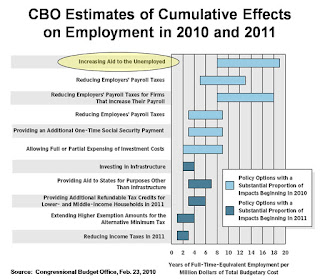The U.S. Congressional Budget Office stated in a late November 2010 report that more than half of people receiving regular State Unemployment Benefits in 2009 exhausted the full duration of their benefit periods. Federally-funded unemployment benefit extension programs provide additional benefit weeks to individuals whose state benefits have expired and can provide up to an additional 53 weeks of benefit to unemployed persons.
December 1 marked the expiration of the funding of these additional benefits by the Federal Government. While many people think these funds are a necessity, the previously discussed idea of “unemployment subsidies” provides some evidence as to why yet another extension is not necessarily a good idea. The CBO suggests extending the benefit yet again will infuse the economy with money. However, it is more reasonable to believe that getting unemployed workers back into the workforce will have more numerous positive effects on the economy. Not only will these workers no longer need subsidies from the government to eat, but as individuals reenter the workforce, more money is put into their hands than would be in the form of an unemployment benefit, and therefore greater amounts of money fed into the economy.
why yet another extension is not necessarily a good idea. The CBO suggests extending the benefit yet again will infuse the economy with money. However, it is more reasonable to believe that getting unemployed workers back into the workforce will have more numerous positive effects on the economy. Not only will these workers no longer need subsidies from the government to eat, but as individuals reenter the workforce, more money is put into their hands than would be in the form of an unemployment benefit, and therefore greater amounts of money fed into the economy.
Another consideration is the position that “there are no jobs”. The U.S. DOL's Employment and Training Administration reports there are five people unemployed for every one open position. For the 14 million people out of work, that would mean there are roughly 2.8 million jobs. Getting working income into the hands of 2.8 million people would be far more beneficial to the economy than another miniscule unemployment subsidy extended by the government, which would actually be just about enough money to keep these 2.8 million fed and therefore not working.
December 1 marked the expiration of the funding of these additional benefits by the Federal Government. While many people think these funds are a necessity, the previously discussed idea of “unemployment subsidies” provides some evidence as to
 why yet another extension is not necessarily a good idea. The CBO suggests extending the benefit yet again will infuse the economy with money. However, it is more reasonable to believe that getting unemployed workers back into the workforce will have more numerous positive effects on the economy. Not only will these workers no longer need subsidies from the government to eat, but as individuals reenter the workforce, more money is put into their hands than would be in the form of an unemployment benefit, and therefore greater amounts of money fed into the economy.
why yet another extension is not necessarily a good idea. The CBO suggests extending the benefit yet again will infuse the economy with money. However, it is more reasonable to believe that getting unemployed workers back into the workforce will have more numerous positive effects on the economy. Not only will these workers no longer need subsidies from the government to eat, but as individuals reenter the workforce, more money is put into their hands than would be in the form of an unemployment benefit, and therefore greater amounts of money fed into the economy.Another consideration is the position that “there are no jobs”. The U.S. DOL's Employment and Training Administration reports there are five people unemployed for every one open position. For the 14 million people out of work, that would mean there are roughly 2.8 million jobs. Getting working income into the hands of 2.8 million people would be far more beneficial to the economy than another miniscule unemployment subsidy extended by the government, which would actually be just about enough money to keep these 2.8 million fed and therefore not working.
No comments:
Post a Comment